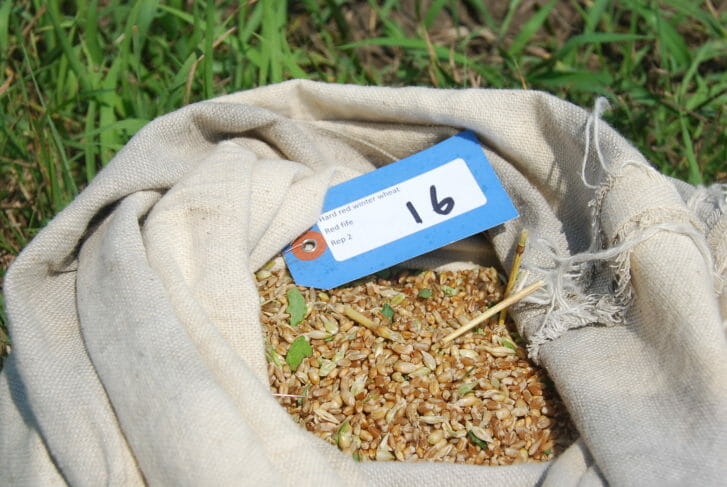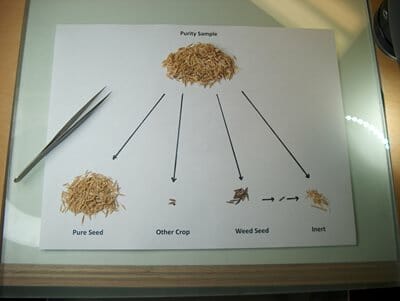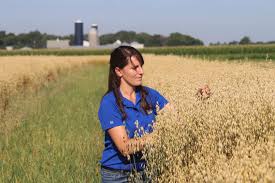Stay on the Right Side of the Law When Selling Cover Crop Seed
Prices for cover crop seed are high this year – particularly cereal rye, our most popular cover crop in Iowa. An enterprising farmer might look at this situation and say “hmmmm looks like a good time to get into the cover crop seed business.” As with any new enterprise, there are regulations to consider before taking the plunge, so to guide us through these requirements we invited Robin Pruisner from the Iowa Department of Agriculture and Land Stewardship and Doan Schmitz from the Iowa Crop Improvement Association on our September small grains shared learning call. They discussed regulations on seed sales and intellectual property requirements around specific plant varieties. In the following blog I have done my best to summarize their discussion, but to ensure compliance with any of the rules discussed below please verify with the proper regulating agency.

Both federal and state regulations govern how freshly harvested grain like this could be sold as cover crop seed to another farmer.
Seed Sales – Permit and Labelling Requirements
Each state regulates the conditions under which seed must be sold within the boundaries of that state and Iowa is no exception. In Iowa, a farmer can save seed from a crop that they produce on their farm with no further permitting or testing required, unless they have signed a license to grow a patented seed (owned by a private company) that stipulates they cannot plant saved seed. For most varieties used for cover crops, you can grow seed and replant it on your own farm with no further steps.
 Once you intend to sell seed to someone else, more rules and regulations start to kick in. All seed sold in the state of Iowa is required to have a seed label that includes a purity analysis, noxious weed examination and germination rate. This information and label must be generated by a registered seed technologist – in Iowa this is most often the Iowa State University Seed Laboratory, but a commercial seed laboratory can also be used as long as they have such a person on their staff. You can find information on how to pull samples for testing on the ISU Seed Lab website, for cereal rye about 2 lbs of seed should be sufficient to run the necessary tests. The seed must have been tested within 9 months of the sale or a new germination test is required. Once ISU or another lab performs the seed test they will provide you with a seed label. Requirements for what must be included on this label can be found on this IDALS fact sheet.
Once you intend to sell seed to someone else, more rules and regulations start to kick in. All seed sold in the state of Iowa is required to have a seed label that includes a purity analysis, noxious weed examination and germination rate. This information and label must be generated by a registered seed technologist – in Iowa this is most often the Iowa State University Seed Laboratory, but a commercial seed laboratory can also be used as long as they have such a person on their staff. You can find information on how to pull samples for testing on the ISU Seed Lab website, for cereal rye about 2 lbs of seed should be sufficient to run the necessary tests. The seed must have been tested within 9 months of the sale or a new germination test is required. Once ISU or another lab performs the seed test they will provide you with a seed label. Requirements for what must be included on this label can be found on this IDALS fact sheet.

This diagram captures the process involved in a purity test where a technician separates live seed from chaffe, weed seed and other crop seed. This generates key information that is included in a seed label. Photo credit.
Now that you have your seed tested and labeled, the next step is to consider whether you need a seed permit in order to sell. In Iowa, “A seed permit is not required of persons selling or advertising seed of their own production, provided that the seed is stored or delivered to a purchaser only on or from the farm or premises where grown.” So, a farmer who is only selling their own seed and storing it on-farm would not be required to obtain a seed permit. However, if you are selling any seed produced by another farmer or stored off-site you are required to obtain a seed permit. A first-year seed permit is $10. In future years the permit fee is a sliding scale base on gross annual sale of seed in Iowa the previous year. You can view the schedule for renewal payments and apply for a seed permit using this form.
By doing due diligence to label cover crop seed and determining whether or not a seed permit is required based on the source and storage of seed, a farmer will be in compliance with Iowa laws relating to seed sellers in Iowa. But, we’re not done yet, as there is a whole set of federal laws which govern the conditions under which specific seed varieties are grown and sold.
Intellectual Property Regulations – Sale Requirements Based on Variety

Melanie Caffe, oat breeder at South Dakota State University, inspects oat lines for desirable qualities to develop new varieties of oats for farmers. Photo credit.
Plant breeding is one of the key ways in which we can improve agricultural production. It allows us to develop genetics that can resist disease and cope with regional weather and soil patterns. Both private companies and public researchers at land grant universities engage in breeding new lines of crops and U.S. law provides protections in both cases to ensure that the breeders are compensated for their work and can continue to breed varieties that are suited to our changing climate, equipment and market demands. In general, publicly produced varieties are protected by Title V of the Plant Variety Protection (PVP) act while privately bred varieties are protected by patents. However, it is possible for a variety to be protected by both a patent and PVP.
USDA’s Agriculture Research Service maintains a website of all of the plant varieties that currently or have ever had PVP protection status. Varieties on this list require certification in order to sell seed under ALL circumstances, which involves planting Registered or Foundation seed; applying for Certification with a State Certifying Agency and undergoing a field inspection; and conditioning and testing the seed at a licensed facility. The Iowa Crop Improvement Association (ICIA) and its analog in other states is the authority on all steps of the certification process. However, if a variety has expired from this list or was bred before 1994, then seed certification is not required in order to sell seed from that variety. Additional costs involved in the certification process are outlined in the table below:
| Certified Seed for PVP Varieties | Common Seed for Non-PVP Varieties | |
| Starter Seed Cost | Certified seed – $15-20 per 50 lbs; Foundation seed – $20-25 per 50 lbs | $10-15 per 50 lbs |
| Application Fee | $50 | $0 |
| Inspection Fee | $3.25/acre with $30 minimum for 10 acres or less | $0 |
| Lot Fee – Conditioning and Testing | $15/lot (up to 1,000 Bu.) | $0 |
| Mechanical Purity Test | Included in Lot fee | $13* |
| Noxious Weed Exam | Included in Lot fee | $10* |
| Germination Test | Included in Lot fee | $18 standard or $30 fast TZ Assay* |
| Royalty | $0.25-0.50/bushel | $0 |
| *Current rates for cereals test at the Iowa State University Seed Laboratory | ||
For small grains, most varieties of oats, barley and wheat are protected by PVP and/or patents because these crops have active public and private breeding programs. The only active public breeding program for rye, however, is in North Dakota, so very few rye varieties are currently protected under PVP. If you want to avoid certification and PVP violations – look for varieties that say “certificate expired” in the PVP database or for other varieties that do not appear on this list – such as Jerry Oats, Rymin Rye or Robust Barley. But, be sure to check with your seed dealer before making your final decision to make sure that you are not purchasing a patented variety which cannot be replanted. The table below contains some common varieties used in cover cropping that are not protected by PVP or patents.
| Rye | Oats | Barley |
| Aroostook | Jerry | Robust |
| Elbon | Ogle | Morex |
| Rymin | Hazel | |
| Wheeler |
So what’s up with all of this Variety Not Stated (VNS) being sold? Is that a loop hole to get around having to certify your seed? The short answer is no – VNS should be a mixture of seed or grain that includes only unprotected varieties. If you have a variety in a VNS mix that is protected by PVP or a patent, then you are violating PVP or patent law. Even if you purchased the VNS from someone else and resold it as VNS seed you are still liable if a PVP variety was discovered in that mix. “It’s not like NCIS where we can test the seed and tell exactly what variety it is,” Robin says, “But, we do enforce the law. One grower in Iowa was intentionally propagating certified seed and not selling it as such and paying the royalties. There was a fine leveraged against them for about $3 million dollars.”
To do due diligence that you’re clear of liability, make sure that you can trust the origin of the seed you’re intending to sell contains only non-protected varieties. Mac Ehrhardt, a participant on the call and co-owner of Albert Lea Seed offered this advice, “What you could do if you really want to be sure you’ve got good stock is to buy certified Aroostook or another old variety, grow it out and then sell it as a ‘common variety’ of those.”
It’s a lot to keep track of, but there are people whose job is to guide you through this process to ensure that you’re meeting all of the legal requirements to sell cover crop seed in Iowa. IDALS, the ICIA and even your local seed salesperson can help guide you through this process so that you are keeping your new enterprise on the up-and-up. If you decide you’d like to take the plunge – shoot me an email at alisha@practicalfarmers.org and I’ll add you to our cover crop directory.
Key Contacts:
- For questions about labeling requirements or State Law – Robin Pruisner, Iowa Seed Control Official Iowa Department of Agriculture & Land Stewardship – Seed Control Official (515) 725-1470 Robin.Pruisner@IowaAgriculture.gov
- For questions on seed testing – Iowa State University Seed Testing Laboratory (515) 294-6826 seedlab@iastate.edu
- For questions on registered seed, approved conditioners, native seed, or quality assurance – Iowa Crop Improvement Association (ICIA) (515) 294-6921 iowacrop@iastate.edu
